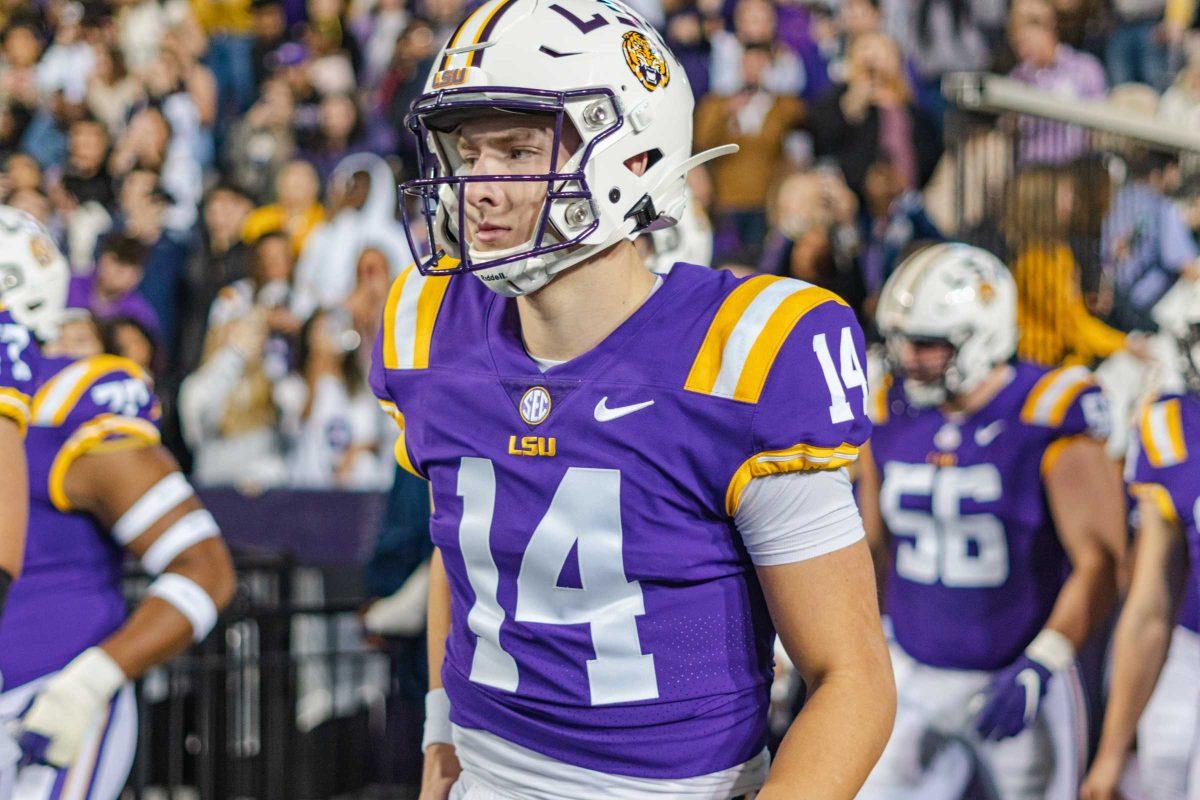Max Johnson’s offense was up 10 points midway through the third quarter when he stared down a 4th and 3 from UL-Monroe’s 14-yard line.
LSU could have kicked the field goal and given their stout defense a larger cushion, but no: Ed Orgeron was fired a few weeks ago, and he was going to be aggressive.
“We didn’t think 13 points was good enough,” Orgeron said.
Offensive Coordinator Jake Peetz called a pass play. Three wide receivers lined up in a bunch formation, and after the snap, ran in three different directions. Jaray Jenkins popped open, but the rush had already gotten to Max Johnson, whose futile throw sailed out of bounds as his knee hit the turf.
Johnson looked frustrated as he picked himself up off the grass.
He was benched last week against Arkansas, but now he was back at the helm of a precarious LSU team. This tilt against the neighboring Warhawks, a far inferior opponent from a far lesser conference, and Johnson had a chance to show that he deserved the starting job in a tune-up game before hosting Texas A&M.
Instead, midway through the third quarter, LSU had managed only 17 points on a team from the Sun Belt.
How did Johnson react when Orgeron told him he was benched last week?
“Like a champ, didn’t say a word,” Orgeron said Monday as LSU was preparing to face ULM.
After Orgeron gave the blue-chip freshman gunslinger Garrett Nussmeier a shot and decided he wasn’t ready yet, he tossed the keys back to Johnson. And LSU handed him a different game plan.
Against ULM, Johnson released the ball notably quicker, connecting with receivers on quick screens and crossing routes. A quick crosser to Malik Nabers, a quick screen to Tyrion Davis-Price, a swing route to Jack Bech: These were plays that took advantage of LSU’s athleticism. They were designed to put skill players in space and make Johnson more comfortable in the pocket.
For the most part, the new approach worked. LSU won 27-14. Despite a conservative scheme, LSU had little trouble creating chunk plays. Two of their first three touchdowns came on short passes that receivers Nabers and Brian Thomas Jr. used their speed to take it to the house after the catch. Johnson’s unit also had no trouble slowly marching down the field. But again, something they have dealt with all season, the Tigers struggled to capitalize in the red zone.
On their first drive of the second quarter, LSU dialed up three runs that gained 10 yards and moved them to the 9-yard line. Three incomplete passes later, LSU settled for a field goal.
“It seemed like we could never throw the knockout punch,” Orgeron said. “And they kept on fighting, so give them credit.”
When Johnson was sacked on fourth down in the third quarter, LSU had entered the red zone four times, but on those drives, they came away with only 10 points. They had mounted two drives that combined for 27 plays and 124 yards, chewing 12 minutes of the clock. On those methodical drives, LSU scored zero points.
Orgeron yanked Johnson against Arkansas after two fruitless drives, which resulted in two punts on two drives, one of which ended in Arkansas territory- and a new quarterback for LSU. The freshman Garrett Nussmeier came in and woke up a sleepy Tiger offense. On his first play, he chucked a 40-yard bomb that fell incomplete, intended for Nabers.
After some ups, some downs and some theatrics, Nussmeier’s debut ended with an interception in the end zone. He sulked after he threw that pick, and Orgeron advised him and his father after the game that it would be wise to redshirt. They obliged, and Johnson took all the snaps the next week.
Against the Warhawks fans saw a different Johnson, and a slightly different offensive scheme, but the same frustrations lingered. Johnson has struggled with deep-ball accuracy all season, so against ULM he rarely visualized deep targets. Davis-Price said this change was based on the defense’s scheme. The offense struggled in the red zone, failing to capitalize on opportunities to put the game away, and leaving opportunities for ULM to climb back into the game.
If the Warhawks hadn’t missed two wide-open receivers in the end zone on two separate fourth downs, maybe the game would have been a lot closer. Maybe ULM pulls off the upset, and Orgeron doesn’t get one last chance to go to a bowl game.
Instead, LSU slogged through a sleepy non-conference November game in front of a sparse crowd, with little to play for and little improvements to make that will matter. They will now try to salvage whatever’s left of their season against Texas A&M.
“Did we play great?” Orgeron asked. “No. Did we make some mistakes? Yeah. But we won the game, and I’m happy for the boys in there.”








